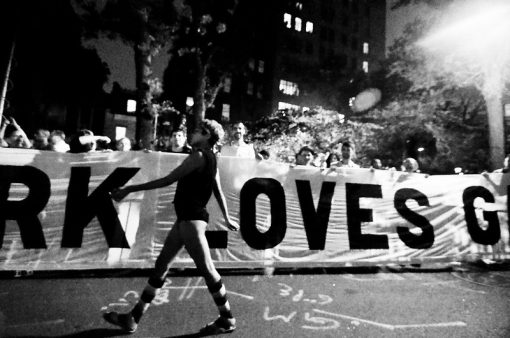Is Gay Marriage a Genuinely Progressive Social Transformation?
16 December 2019
On 22nd May 2015, many referendum voters in the Republic of Ireland made history: 62.07 % of them stated that they were in favour of legalising same-sex marriage. Yep, 62.07 % of voters in the Hibernian bastion of repressive Catholic theocracy since 1937. For so many actively campaigning for LGBTQ rights and combatting the oppressiveness of heteronormativity, the long-standing ideology that the ultimate life goal for society is heterosexual marriage with the goal of having children through the traditional nuclear family structure, this was a cause for celebration. Liberals had struck a progressive blow against bigoted bishops, dodgy deacons, and creepy cardinals – gays and lesbians no longer had to hide and express their love in the safe, private quarters of LGBTQ circles. They could now be free to legitimate their love in the wider public sphere. Hooray!
Now, from a left-wing perspective, isn’t the extension of gay marriage to homosexual couples obviously a good thing? Surely, I would have to be homophobic or a religious traditionalist to claim that there is something disconcerting about gay marriage and that progressives are perhaps wrong to construe the legalisation of gay marriage as a bona fide exemplar of progressive social change? Well, no. I’m definitely not, at any cognitive and political level, homophobic. I’m also definitely not, again at any cognitive or political level, a religious traditionalist.
Yet, as a critical social theorist, I continue to be very concerned about the disconcertingly uncritical features of the whiggish proclamation that gay marriage is a profound victory for LGBTQ rights and an ostensible marker for radical, modern, democratic transformation. Following Judith Butler’s pioneering queer theoretical distinction, I am politically supportive but critically accepting of gay marriage. Purely in order to counter homophobic discourses am I supportive of gay marriage. However, I do not want to be, therefore, in favour of gay marriage. Why?
For all of the putative attractiveness of the inclusion of homosexual relations as legitimate instances of the social institution of marriage, there are good reasons to believe that the liberal claim to progressiveness and the claim to the revision of traditional conceptions of the family following the 2015 referendum’s seismic result occlude severe structural problematics with how modern democratic states constitute the family. To be meaningfully progressive, I think one must displace liberal egalitarianism and static conceptions of recognition with conceptions of justice and family life that are not blind to structural inequalities facing marginalised social groups.
From a critical perspective influenced by the remarkable resources of queer theory, gay marriage masquerades itself as a radical social achievement, and is in fact a coded ideology serving to create a pathological genus of doubt about the metaphysical legitimacy of non-marital relationships. This particular variety of doubt is crippling and deeply distressing, preventing a healthy practical-relation-to-one’s-beloved. For example, if your lover is not officially recognised, can you even mourn for them? If your lover is not officially recognised, can you even be said to have lost them if the relationship ends? Marriage – whether heterosexual or homosexual – as the institution which legitimates family, kinship and sexual relations between partners is painfully conservative. As Judith Butler puts it:
“If you’re not real, it can be hard to sustain yourselves over time; the sense of delegitimation can make it harder to sustain a bond, a bond that is not real anyway, a bond that does not “exist,” that never had a chance to exist, that was never meant to exist. Here is where the absence of state legitimation can emerge within the psyche as a pervasive, if not fatal, sense of self doubt. And if you’ve actually lost the lover who was never recognised to be your lover, then did you really lose that person? Is this a loss, and can it be publicly grieved? Surely this is something that has become a pervasive problem in the queer community, given the losses from AIDS, the loss of lives and loves that are always in struggle to be recognised as such”
What makes a group a family? Something like that group having caring relationships towards one another and sharing domestic space, at the very least, right? As Hegel rightly contended, family life is built, not on marriage, but on and sustained by the uplifting intersubjective qualities of love. Marriage, therefore, plays no grounding role in making a sense of what a family is. Rather, its ideological purpose is to function as the social institution for metaphysically constituting family life by legally constituting family life. If anything, there are many families that are not structured around a marriage:
- Adult children living with and caring for parents
- Relatives (often grandparents) raising other relatives’ children
- Blended families
- Extended families (often Travellers or immigrants)
- Care-giving relationships that have developed to provide support to the vulnerable or ill
- Single, separated and divorced people
- Single, separated and divorced parents
- Close friends, ex-lovers or siblings who live in long-term, committed and interdependent relationships
- Senior citizens living together
- Intimate groups with more than two parents
- Households where there is more than one conjugal partner
- Homosexual conjugal couples where a state licence is unavailable
Modern states explicitly disincentivise non-marital relationships and arrangements, for non-marital kinship structures are not admitted into state-protection and state-incentive protocols (such as tax breaks) despite having caring relationships. On the one hand, ‘kinship hermeneutic anarchism’, i.e. self-interpreting independently of marriage-centric or marriage-steered patterns of (un)marked ideological recognition, can be liberating. In this crucial respect, the active and sustained debunking of ‘normal’ by queer activism and queer theory shares many of the Nietzschean Ubermensch qualities: robust independence and emancipation from (hypocritical) bourgeois norms. On the other hand, the often raw need to be recognised and legitimated by the state, reproduces kinship structure hierarchies, extending the reach of the status quo. As Butler writes:
“Indeed, in making a bid to the state for recognition, we effectively restrict the domain of what will become recognisable as legitimate sexual arrangements, thus fortifying the state as the source for norms of recognition and eclipsing other possibilities within civil society and cultural life”.
Therefore, the liberal claim to progressiveness, extending marriage to homosexuals, is not just premature, but a disturbing form of ideology.
Photo: New York City Drag March Turns into Celebrations in W. Village by Zach D. Roberts on Flickr.
- July 2024
- June 2024
- May 2024
- April 2024
- March 2024
- February 2024
- January 2024
- December 2023
- November 2023
- October 2023
- September 2023
- August 2023
- July 2023
- June 2023
- May 2023
- April 2023
- March 2023
- February 2023
- January 2023
- December 2022
- November 2022
- October 2022
- September 2022
- August 2022
- July 2022
- June 2022
- May 2022
- April 2022
- March 2022
- February 2022
- January 2022
- December 2021
- November 2021
- October 2021
- September 2021
- August 2021
- July 2021
- June 2021
- May 2021
- April 2021
- March 2021
- February 2021
- January 2021
- December 2020
- November 2020
- October 2020
- September 2020
- August 2020
- July 2020
- June 2020
- May 2020
- April 2020
- March 2020
- February 2020
- January 2020
- December 2019
- November 2019
- October 2019
- September 2019
- August 2019
- July 2019
- June 2019
- May 2019
- April 2019
- March 2019
- February 2019
- January 2019
- December 2018
- November 2018
- October 2018
- September 2018
- August 2018
- July 2018
- June 2018
- May 2018
- April 2018
- March 2018
- February 2018
- January 2018
- December 2017
- November 2017
- October 2017
- September 2017
- August 2017
- July 2017
- June 2017
- May 2017

